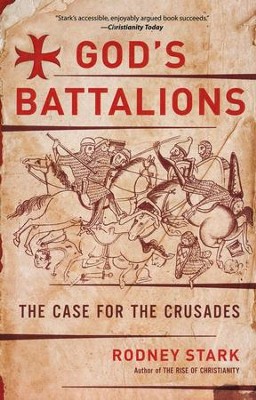My pick this time around for my book-of-the-month selection is God’s Battalions by Rodney Stark. The subtitle alone should be enough to give any thinking Christian a desire to read it now—”The Case for the Crusades.”
Somewhere down near the bottom of my to-do list is my desire to write a short little book entitled Bad Christians, in which I seek to rehabilitate, explain, or otherwise contextualize some of the pariahs of church history. You know, to talk about what really happened with the Salem witch trials, or why Robert E. Lee was a good man, or . . . of course . . . the Crusades. If I ever get around to it, this book of Stark’s will most certainly make its presence felt in the footnotes.
Between the years 1095-1291, there were seven major crusades, and Rodney Stark contextualizes all them, and does it in clear, accessible prose, backed up with what is obviously a massive amount of learning. This is really good stuff. Get the book today. Make sure to do your part to make revisionist history cool again.
Stark explains and in large measure defends the crusades, and he does this without sugar coating anything. He does not justify atrocities, for example, but he does explain the entire context in a way that is truly helpful. This is diligent history, and not a hagiographic treatment of every last Crusader sin. As a Protestant, for example, it is necessary for me to look askance at the promise of salvation handed out to all those who “took the cross,” as though men could be justified by Muslim blood on their swords rather than Christ’s blood on their hearts. So theologically speaking, the Crusades were a hot mess. So much is assumed. But as a matter of straightforward history, to be distinguished from the ax-grinding history that has used the Crusades as a stick to beat Christianity with, this book is a real blessing.
I was already aware of the fact that the Crusades were actually a long overdue reaction to Muslim aggression, and not at all what they are commonly assumed to be, which is an unprovoked attack on all the pacifists of the Middle East.
Two examples of how context helps. I was already largely aware of the Christian/Muslim scuffles and interactions that led to the Crusades, but one of the things that surprised me was the background that Stark gave on the interactions between the Western Crusaders and Byzantium. His contextualization really helped me to make sense of the Fourth Crusade, including the Sack of Constantinople. Oh, thought I. That’s why.
Another example was the detail that Stark gave about some of the attacks on the Jews on the way to the Middle East, fueled in part by bigoted malice and also in part as a way of financing their efforts. He does not defend or explain any of that away, not at all. But would it surprise you to learn that a number of bishops provided refuge for the Jews in their own homes, and that there were papal pronouncements condemning those attacks?
All in all, if you get this book, and read it in a fair-minded way, you will learn a goodish bit.


